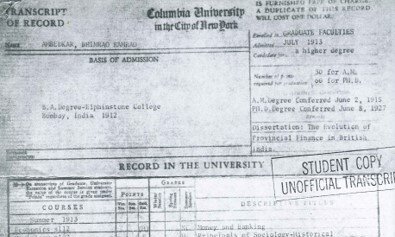We want to think about how Ambedkar's own intellectual formation might open up new ways to understand the history of the University, ways to turn the University inside out, if you will, to open up the University to novel gaze, to rethinking its relationship with its neighbors. For instance, with Harlem, but also the links between the University and the world and the ways in which the figure of Ambedkar might allow us to do so.
Read MoreWe started [the Ambedkar Initiative] in 2018—about a century after B.R. Ambedkar studied at Columbia University. This is a project of critical commemoration, which thinks about the distinctive legacies of a figure who stretched ideas of democracy and equality in fundamentally new directions ... But we also want to think about how Ambedkar’s own intellectual formation might open up new ways to understand the history of the University.
Read MoreSeeing Bombay/Mumbai through the words of R.B. More is a fascinating challenge to the historical conundrum of archival absence or textual misreading. Narratives about Dalit life in Bombay appear in More’s autobiography through descriptions of spaces hitherto little explored, or documented, especially through histories of performance such as theatre, and songs of protest and persistence that are passed down generations. Wandana Sonalkar’s translation of More’s autobiography is revelatory of More’s own Bombay, a spatial and cultural entity emerging from the places of cultural production he frequented. When describing his early life in the city, Moré leads the reader into these cultural spaces.
Read MoreIn this interview, Suraj Yengde speaks with Borderlines on how Dalit intellectual assertion is shaping new horizons for politics, media, and academia across the globe. He discusses Ambedkar's writings and life as a mark of the intersection between critical Dalit and Black thought; and perceptions of the term Dalit within and outside of India. He outlines what it means to build Dalit-Muslim solidarities, how to analyze Prime Minister Narendra Modi's leadership through the lens of caste, and the pressing question of political prisoners in India. The interview explores multiple projects Yengde has taken on, including his books Caste Matters and the Radical in Ambedkar (co-edited with Anand Teltumbde), and the Dalit Film Festival.
Read MoreIn this collage-essay, Josué David Chávez uses data visualization technology to ‘map’ R.B. Moré's recently translated memoirs. By using the text Chavez attempts to visualize possible acts of imagination by Moré as he traversed the chawls of Bombay. Chavez asks how these visuals could have provided Moré with a way to recognize injustices that needed redress but existed beyond the field of legibility for existing models of identity-based justice [cover image: RB More (far left, standing) with his wife, Sitabai, and family. Photo courtesy of Subodh More].
Read MoreBased on her research at the Rare Book and Manuscript Library at Columbia University, Rohini Shukla outlines the intellectual formations behind B.R. Ambedkar’s education at Columbia. This article explores the impact of Franz Boas, Raymond C. Knox and Wendell T. Bush on the shifting nature of the academic disciplines that Ambedkar studied, and demonstrates their impact on his essay “Castes in India”
Read MoreOn the 10th anniversary of The Caste Question, Anupama Rao speaks to Kelvin Ng about the questions that her book addressed and the debates it raised. They discuss how the book shifted the debate on caste from questions of social justice and the state to problems of personhood and Dalit subject formation; the way it drew from writing on slavery, anti-slavery and emancipation; Ambedkar’s anger at the unavailability of the Dalit subject in history; the dilemmas of competing minorities: the emergence of the Dalit subject and the unmaking of the Muslim subject in South Asia; different receptions to the book; the convergence of subaltern thought with global history; and contemporary Indian politics as a contingent and conjunctural process.
Read MoreIs caste a peculiarly South Asian problem? Joel Lee talks to N. Paul Divakar, Rita Izsák-Ndiaye, and Mohamed Nur Iftin, at the sidelines of the International Congress on Discrimination based on Work and Descent, Casteism, Antigypsism, Traditional and Contemporary Forms of Slavery and Other Analogous Forms of Discrimination about groups across the world who face enforced endogamy, and coerced occupational specialization in stigmatized forms of labour, and asks them to critically reflect on a new concept in global thought: Discrimination based on Work and Descent.
Read More






